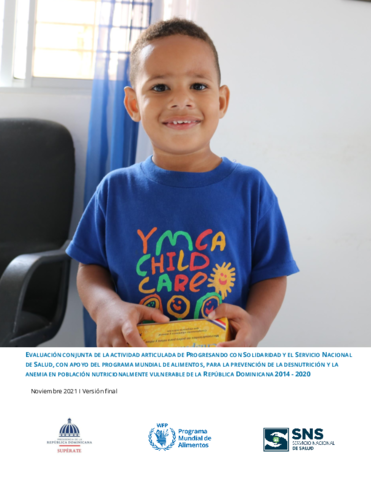
This joint decentralized evaluation was commissioned by WFP Dominican Republic and its governmental counterparts Superate and National Health System. It covers the joint articulated activity for the prevention of malnutrition and anaemia in nutritionally vulnerable populations during the period 2014-2020.
This evaluation met a dual objective of accountability for results and learning, which had been mutually reinforced, with a focus on learning; and its purpose was to support decision-making regarding the redesign and continuity of activities. Six key evaluation questions covering the criteria of relevance, coherence, effectiveness, efficiency, impact, and sustainability guided the evaluation process.
Key evaluation findings included:
- The high rates of anaemia and child malnutrition justify this type of interventions. The nutrition component developed a targeting tool that made it possible to serve people living in structural poverty, including undocumented migrants.
- The nutrition component is fully aligned with national commitments. It is also coherent with WFP’s regional and global strategies and policies.
- The centralized logistics system has limited distribution capacities and is based on availability rather than needs. Weaknesses in monitoring have been identified that do not allow the evaluation team to fully assess the effectiveness of the operation. The lack of monitoring data was compensated by thematic studies and quality intermediate impact studies.
- Participating institutions achieved to work together effectively but with some challenges at the national, regional, and local levels.
- Intermediate studies show notable impacts in terms of reducing beneficiaries’ anaemia and stunting. Multiplier effects were identified at the following levels: (i) operations of the participating institutions; (ii) families with production and consumption activities; and (iii) WFP contributions that have made the multisectoral problems of hunger visible.
- The regulatory and institutional framework must be strengthened to guarantee the sustainability of policies to prevent stunting.
The evaluation recommendations were centred around strengthening the nutrition component, implementing a roadmap for the achievement of SDG2 and improving nutritional information and surveillance systems.



